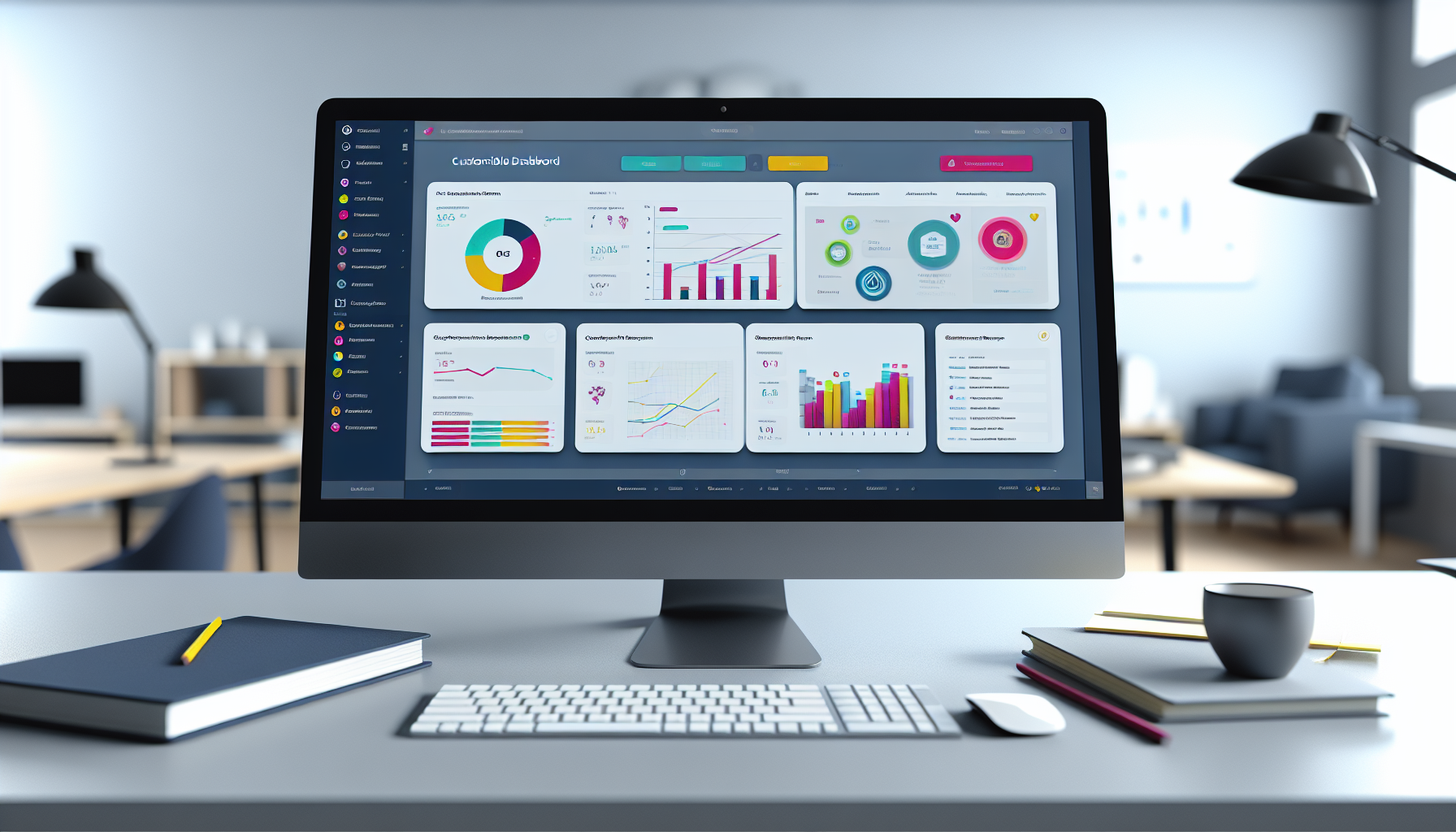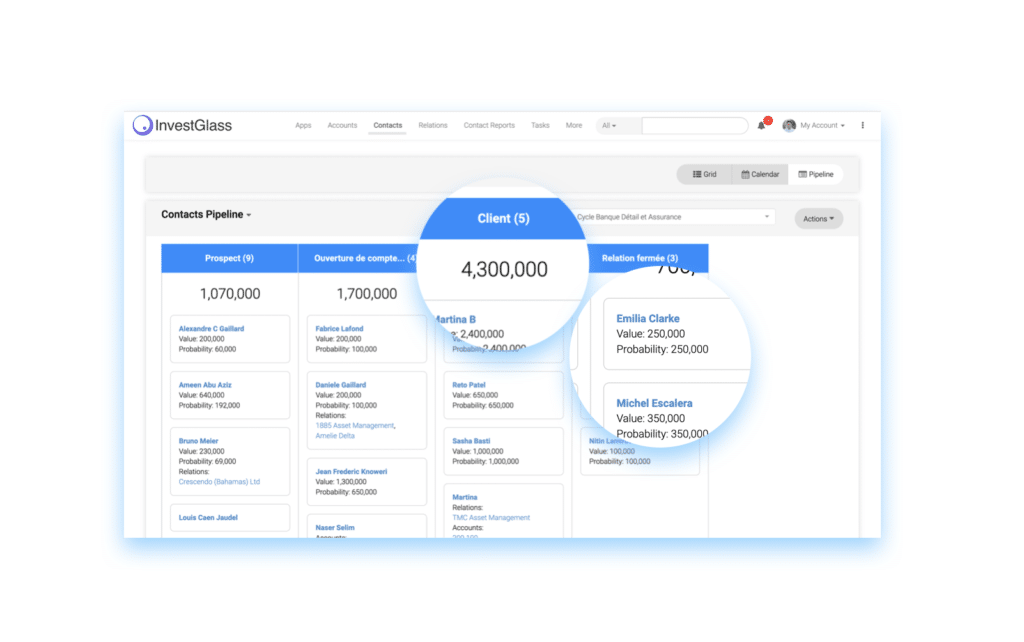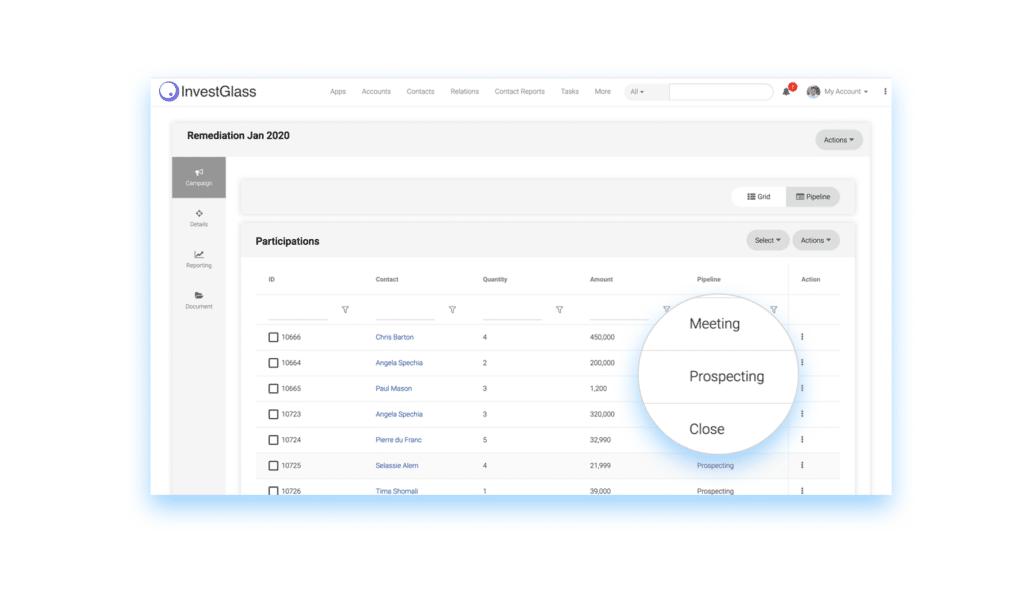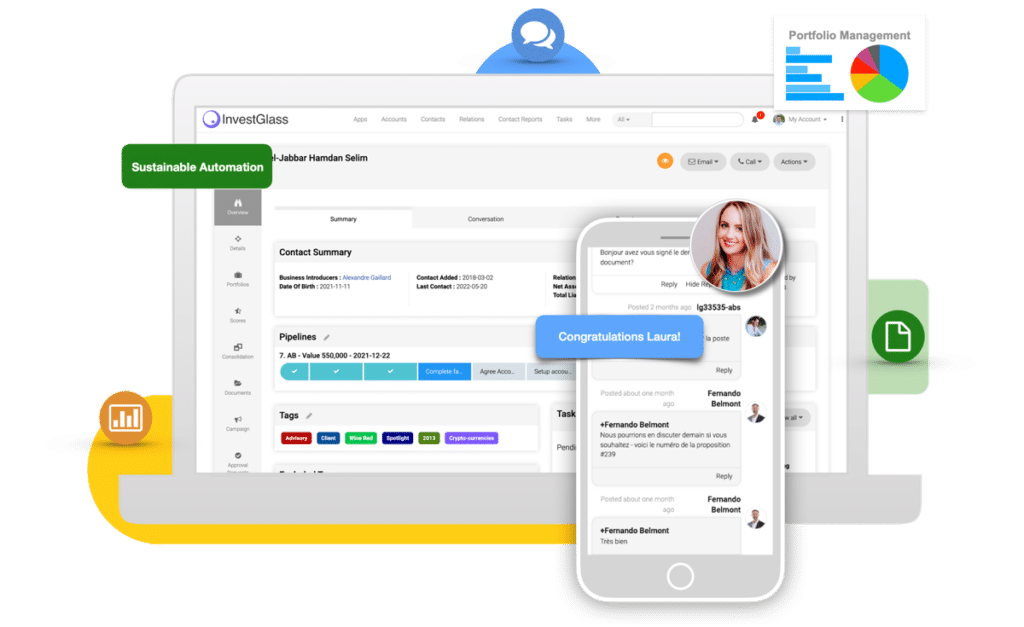
Top Picks: Best CRM for Education in 2024 for Enhanced Student Engagement
Written by InvestGlass on .
In your search for the best CRM for education, the goal is to enhance student connection and refine academic administration. Knowing which CRM systems rise to the challenge can be a game-changer for your institution. This review cuts through the noise to detail top performers that meet the complex demands of educational institutions, balancing operational excellence with the privacy and engagement needed in 2024.
Key Takeaways
- CRM systems in education centralize data management and streamline administrative tasks, enabling personalized student engagement and lifecycle management, leading to improved enrollment and retention rates.
- Key CRM features for educational institutions include advanced communication tools, workflow automation, customizable reporting and analytics, and robust data security, which are critical for enhancing operational efficiency and strategic decision-making.
- Selecting the right CRM for an educational institution requires a thorough assessment of needs, comparison of features and pricing, and consideration of ease of use and support to align with the institution’s specific goals and processes.
Why CRM for Education Matters

CRM implementation has revolutionized operations and student interactions within the education sector. CRM for education brings a multitude of advantages, from bridging communication gaps to enhancing student success, thus boosting enrolment and retention rates. The advent of CRM solutions in education has helped schools meet the rising digital engagement expectations of students, thus maintaining a competitive edge in the education industry.
Furthermore, CRM platforms offer the following benefits for higher education institutions:
- Bolster student engagement through personalized learning pathways and proactive communication strategies
- Proactive alerts and conversational chatbots, enabled by CRM systems, lead to increased student enrollment and retention
- Allow institutions to manage relationships with various stakeholders, including students, parents, staff, and alumni
- Establish a unified view of constituent information
Education CRM software has emerged as a vital component for higher education institutions, providing these benefits and more.
Streamlining School Operations
Educational institutions encounter a variety of challenges in managing their operations. From handling student data to streamlining the admissions process to student management, these tasks can be quite overwhelming. This is where a CRM system proves beneficial. CRM systems in education centralize data management, allowing all communications and documents to be stored and accessed by staff, which improves response times and document management. This, in turn, facilitates efficient communication, ensuring essential information reaches all relevant parties and prevents processing delays.
In addition, CRM platforms in education offer the following benefits:
- Minimize paperwork
- Enable online document submission
- Streamline application tracking
- Automate workflows
- Manage campaign management
- Create tasks
- Log activities
- Track donations and financial goals
- Automate lead and applicant tracking
- Systematize contact management
These features contribute to operational efficiency and help educational institutions manage recruitment and enrollment processes efficiently.
Enhancing Student Experience
In today’s digital era, students demand personalized, intuitive experiences. Educational institutions are obligated to meet these expectations to nurture student success. CRM systems are instrumental in augmenting the student experience. They analyze student behavior, preferences, and needs, thereby enabling the delivery of personalized and effective learning experiences. Furthermore, CRM tools track student interaction with online course materials and offer insights to adapt academic support according to individual student needs.
A centralized CRM system further enhances the student experience by streamlining lifecycle management for stakeholders, including students, faculty, and staff. Streamlining service through a single communication platform can lead to higher student enrollment and retention rates. CRMs facilitate timely and personalized academic support by identifying students who may be at risk, through smart alerts and communication channels. By viewing students as ‘customers’, CRMs help in building stronger relationships and tailoring interactions to boost admissions and enhance student commitment.
Key Features to Look for in an Education CRM

Selecting the appropriate CRM for your educational institution isn’t merely about opting for the one with the largest feature set. It’s about finding the integrated CRM platform that offers the right features that align with your institution’s goals and needs. Some of the important features to consider include:
- Advanced communication tools
- Workflow automation
- Customizable reporting and analytics
- Robust data security and compliance
These features are crucial not only for managing student and staff interactions but also for ensuring the seamless operation of the institution, ultimately contributing to institutional and student success.
Advanced communication tools, such as personalized sequences and scheduling capabilities, are vital for sustaining effective communication with students and staff. Workflow automation features help streamline processes and reduce administrative burdens. Customizable reporting and analytics are crucial for tracking performance and informing decision-making processes. Lastly, robust data security and compliance with industry regulations such as GDPR and HIPAA are essential for protecting the privacy of student and institutional data within an Education CRM platform.

Contact Management
An effective contact management system forms the backbone of a robust customer relationship management (CRM) platform. It serves as the foundation upon which all other CRM functionalities are built. An effective higher education CRM system should include customizable forms and fields to meet the evolving requirements of educational institutions. Such customization features allow for the creation of student personas and tailored communications, which are essential for engaging student bodies effectively.
A CRM system should enable educational institutions to:
- Categorize and segment leads, assisting in personalized engagement and efficient follow-up strategies
- Have contact management features such as client interaction tracking, customer segmentation, and activity management
- Seamlessly integrate with campus systems, as provided by Slate CRM, to minimize disruptions and maintain continuity in contact management.
Personalized student experiences are enhanced by a CRM’s capability to track and manage students and utilize data like academic performance and attendance records.
Communication Automation
In the rapidly evolving digital landscape of today, punctual and responsive communication is vital. An education CRM should come equipped with tools for automating communications such as chatbots, live chat, and email automation to facilitate responsive two-way feedback with students. These automation tools not just streamline messaging, but they also improve responsiveness, thereby boosting student engagement and satisfaction.
CRMs in education offer several benefits, including:
- Tracking student interactions across various platforms
- Delivering personalized information
- Creating segmented and targeted emails
- Nurturing prospects into applicants
- Supporting consistent and tailored communications
- Automating repetitive tasks for admissions teams
- Facilitating the scheduling of appointments, reminders, and other activities
These features enhance productivity and improve the overall efficiency of the admissions process.
Moreover, CRMs offer the following features:
- Automatic feeding of contact information from various sources, such as forms on a school’s website
- Dynamic forms and hidden fields to improve lead capture
- Segmentation and personalized follow-up
These features help improve lead generation and management and enhance the overall efficiency of a school’s CRM system.
Reporting and Analytics
The capability to monitor and scrutinize performance data is a critical functionality of an education CRM. With customizable dashboards and real-time reporting, educational institutions can get valuable data insights gain up-to-the-minute insights on sales trends, campaign performance, and overall team productivity, which can drastically impact student engagement and recruitment strategies. These data-driven insights help institutions understand their performance and inform strategic decisions and student success initiatives.
Institutions using CRMs like Salesforce have seen a 195% return on investment over three years and a payback period as short as seven months, while Pipedrive’s revenue forecasting assists in projecting enrollment-related revenue, illustrating the financial benefits and operational efficiency gains. Furthermore, CRMs contribute to organizational development, with student information systems providing reports that help identify and address operational issues, thereby facilitating a culture of continuous improvement within educational institutions.
Top 7 Education CRMs for Enhanced Student Engagement

Despite the abundance of CRM platforms in the market, not all cater to the distinct requirements and challenges of the education sector. This section presents a curation of the top seven CRM platforms that are known for their exceptional features and capabilities in enhancing student engagement. The platforms include:
- monday Sales CRM
- Salesforce Education Cloud
- InvestGlass CRM
- Zoho CRM Education
- Keap
- Pipedrive
- Slate CRM
These CRM platforms have been carefully selected based on their ability to meet the diverse needs of educational institutions. They offer a range of features tailored for higher education, including managing faculty relationships, data management strategies, and personalized student interactions. Moreover, these platforms stand out for their comprehensive and user-friendly interfaces, robust functionality, and commitment to data security and compliance.
monday Sales CRM software
monday Sales CRM is a platform that offers features tailored for higher education such as managing faculty relationships, establishing data management strategy, and personalized dealings with students and departments. The CRM has been highly rated with a score of 4.7 out of 5 on G2, and offers mobile apps for both iOS and Android devices to ensure remote access and flexibility.
monday Sales CRM offers various pricing plans, starting at $36/month for a package that includes 3 users with annual billing. The platform is designed to manage any department, program, and even student information and communication effectively from anywhere, allowing for comprehensive educational management.
Salesforce Education Cloud
Salesforce Education Cloud is a comprehensive CRM system that supports classic school CRM operations catered to both K-12 and higher education settings. It distinguishes itself with its utilization of Education Data Architecture (EDA), which is designed to facilitate seamless connections with students.
However, considering its range of capabilities and specialized features, Salesforce Education Cloud may represent a more expensive option for some educational institutions.
InvestGlass CRM software – the best crm software
InvestGlass CRM is another platform worth considering, especially for educational institutions on a budget. It offers a free plan, which includes a suite of tools suitable for educational institutions. The platform’s marketing automation tools allow for the creation of email marketing campaigns and online content personalization for prospective students.
Moreover, the CRM’s sales automation tools streamline processes such as admissions inquiries and follow-ups, providing educational staff with efficient workflows. The CRM is suited for small and large education institutions.
InvestGlass offers two solution on premise, or on a generic cloud based platform. The solution is build to automate business operations and the entire student journey, from new students to alumni programs. Student information is securely stored in a NON-US CRM which is importal for educational organization who cares about data sovreignty.
The portal is used by university to support students and their parents. The portal is used to streamline communication and to store elements such as academic records. We are glad to offer you a free demo.

Zoho CRM Education
Known for its flexibility and robust functionality, Zoho CRM Education is a platform that caters effectively to the needs of educational institutions. Zoho CRM’s Canvas feature allows education professionals to customize the CRM interface to suit their specific education data needs by using a drag-and-drop editor. With Zoho CRM, schools can:
- Manage prospective and current student details effectively
- Streamline processes with the Sales Process Builder
- Utilize performance tools such as gamification to improve productivity.
Sales capabilities in Zoho CRM include quote and finance management systems, partner portals, and integrated calendars, contributing to comprehensive deal management. Notably, Zoho CRM ensures that professionals can manage admissions and student engagement from anywhere through its mobile application and remote work features.
Keap
Keap is specifically created to enhance and make learning management systems streamline sales and marketing processes, offering optimized automation to make tasks more efficient. It helps universities:
- Establish essential initial touch points with prospects
- Maintain follow-up with prospects
- Direct their marketing campaigns more effectively through automation
Universities that require robust outreach, recruitment, and enrollment management may find Keap most beneficial.
Pipedrive
Pipedrive provides the following features for educational institutions:
- Customizable pipelines and web forms that cater to the specific admissions process
- Streamlining and visualizing the student enrollment journey
- Facilitating effective student and staff communication by providing timely updates about important milestones
These features are key factors in attracting prospective and current students, ensuring student retention, and maintaining transparency throughout the entire student lifecycle.
Through detailed channel metrics and a comprehensive view of interactions, Pipedrive assists educational organizations in identifying the most effective channels for student recruitment. Furthermore, Pipedrive supports team collaboration by offering features for planning activities and sharing updates, essential for a cohesive admissions team environment.
Slate CRM
Last but not least, Slate CRM is specifically designed for admissions and enrollment professionals, providing a comprehensive system for admissions, student success, and advancement offices through a unified interface. With an all-inclusive license, Slate CRM offers access to all of its features, ensuring there are no hidden costs, providing substantial value, especially when starting at $30,000.
Slate CRM boasts integration capabilities with numerous higher education applications such as Banner, Colleague, PeopleSoft, PowerCampus, and Jenzabar, enhancing its applicability in diverse educational environments. While Slate CRM has a solid system rating of 4.4 out of 5, it is important to note the reported drawbacks including a steep learning curve with non-intuitive navigation and the occasional variability in customer service. Nonetheless, the CRM supports collaboration and efficiency with features enhancing teamwork, like a shared content repository and mobile capabilities which expedite procedures such as the enrollment process.
How to Choose the Right CRM for Your Educational Institution
Selecting the appropriate CRM for your educational institution necessitates meticulous deliberation and planning. It’s not just about picking the CRM with the most features or the one with the cheapest pricing. Instead, it’s about understanding your institution’s unique goals and needs, comparing features and pricing, and evaluating the platform’s ease of use and support.
Given each educational institution’s uniqueness, there’s no universal CRM solution. Instead, you should aim to find a CRM that aligns with your institution’s specific goals, processes, and requirements. This might mean prioritizing certain features over others or opting for a CRM that offers more customization options. Ultimately, the right CRM for your institution is the one that best meets your needs and helps you achieve your educational goals.
Assessing Your Needs
The initial step in choosing the appropriate CRM for your educational institution involves assessing your needs. This involves identifying the goals and objectives that you aim to achieve with a CRM system. Including key stakeholders such as:
- staff members
- faculty
- administrators
- students
in this assessment ensures that the chosen CRM aligns with the institution’s goals.
Defining what information needs to be managed—pertaining to students, faculty, staff, and alumni—is vital for supporting the institution’s objectives. Consideration should also be given to how the institution plans to leverage the CRM, the student portal personnel access requirements, and the level of digital transformation aimed for.
Comparing Features and Pricing for the educational sector
Upon gaining a clear comprehension of your institution’s needs, the subsequent step involves comparing the features and pricing of different CRM platforms. This involves:
- Understanding the total cost of ownership, such as upfront fees and ongoing expenses
- Considering potential efficiency gains from automated student data management
- Crucially, considering the platform’s technological up-to-dateness and compatibility with your existing software ecosystem.
Ease of use is another vital consideration. Look for CRM platforms that offer user-friendly interfaces, fewer clicks for basic tasks, and straightforward training for new users. Also, consider the platform’s support services. Responsive and accessible support services are crucial for resolving issues and optimizing the use of CRM features. It’s also helpful to sign up for a demo or free trial to evaluate the CRM’s functionality and gather feedback from future users.
Considering Ease of Use and Support
Ease of use plays a significant role when selecting a higher education CRM platform. A system that is hard to navigate or understand can lead to inefficiencies and frustration among your team. Therefore, it’s crucial to choose a CRM that is intuitive and user-friendly. For instance, InvestGlass CRM is known for its ease of use and integration capabilities, making it a versatile tool in education marketing. Zendesk’s higher education software is both user-friendly and quick to implement. It also provides a seamless user experience for educational institutions..
The level of support offered by the CRM platform is another crucial consideration. Having access to ongoing CRM support for troubleshooting and queries is essential for the smooth operation of the system. For example, Pipedrive provides a reliable customer support structure, as evidenced by its high customer satisfaction rates.
Ultimately, considering the ease of use and support when choosing a CRM platform can significantly impact the success of its implementation.
Summary
In conclusion, integrating a CRM system into your educational institution can bring about transformative changes, from streamlining operations to enhancing student engagement. However, choosing the right CRM is crucial and requires careful consideration of your institution’s unique needs, the features and pricing of various platforms, and their ease of use and support. Remember, the ultimate goal is to find a CRM that aligns with your institution’s goals and processes, helping you foster student success and streamline institutional operations. So, take the time to assess your needs, compare options, and make an informed decision. The right CRM for your institution is out there, and with it, the future of education is in your hands.

Frequently Asked Questions
What is a CRM for education?
A CRM for education is a software that centralizes student and parent data, streamlines departmental operations, and supports interactions with prospective and current students, alumni relations, and other stakeholders in the education sector. It also facilitates event planning, registration tracking, marketing automation, and relationship management with all customer types.
Do schools use CRM systems?
Yes, CRM systems are used by schools to understand prospective students and tailor their marketing efforts to attract and retain more qualified candidates.The CRM can be used also to store student records and student progress. InvestGlass CRM offers power tools to analyze data.
How do universities use CRM?
Universities use CRM to centralize donor and alumni information, sending automated communications to keep everyone updated on the institution’s success.
What are some top CRM platforms for education?
Some top CRM platforms for education are monday Sales CRM, Salesforce Education Cloud, InvestGlass CRM, Zoho CRM Education, Keap, Pipedrive, and Slate CRM. Consider exploring these options to find the best fit for your educational institution.
How should I choose the right CRM for my educational institution?
When choosing a CRM for your educational institution, assess your needs, compare features and pricing, and evaluate ease of use and support to find the perfect platform.